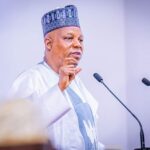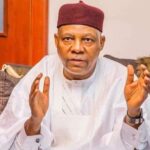May 2022 signifies a landmark in the healthcare delivery history of Nigeria as the National Health Insurance Scheme (2004) was repealed by the National Health Insurance Authority (NHIA) Act. The golden provision in the new legislation is that health insurance coverage has been made compulsory for all Nigerians and the country’s inhabitants. It is a laudable provision as it has provided a legal foundation for large-scale uptake of health insurance coverage in Nigeria – a step toward the attainment of Universal Health Coverage (UHC) in Nigeria.
UHC connotes a situation where everyone has access to the health care services they need, when and where they need them, without any financial difficulty. The National Health Insurance Scheme Strategic Plan (2020-2030) stated that only about 4.2per cent of Nigerians are covered under Social Health Insurance. This translates to about 8.4 million persons out of an estimated population of 210 million Nigerians, underscoring the level of effort that is required from all relevant stakeholders in the healthcare delivery space in the journey towards the actualization of this global healthcare goal.
- I was pressured to reject national honour – Kaigama
- North East: 755 civilians killed by explosive ordinance in 6 years – Minister
To kick-start the implementation of the laudable provisions of this new legislation and in keeping with its Section 4; a Governing Council that would serve as the policy arm of the Authority is to be constituted. They are to perform key roles such as the approval and registering of third-party administrators (e.g., HMOs); lead the implementation of the policies and guidelines; regulate and supervise the various health insurance schemes under the Act; met out disciplinary actions against any erring HMOs, among others. In essence, without the board being constituted more than four months after the NHIA Bill became an Act, carrying out the full duties of the National Health Insurance Authority in driving the attainment of Universal Health Coverage in Nigeria is pending. There is therefore a need for the office of the president of the Federal Republic of Nigeria to set up the Governing Council for the NHIA to commence its full duty.
In some states of the federation, the States’ Health Insurance Scheme Laws provide for the compulsory uptake of health insurance by all inhabitants of the states. For the Health Insurance Agencies to operate optimally, its policy arm being in place is critical. The challenge is that the executive arm of government in some states are yet to set up the Governing Council/Board for the State Health Insurance Agencies, limiting the capacity of the Health Insurance Agencies to deliver on their mandate of effectively regulating the health insurance schemes in the states among other crucial roles. It is indeed an advocacy point to be taken forward by the civil society organisations to the relevant stakeholders (notably to the office of the Executive Governors).
On health care provision for the indigent and the poor, the new NHIA Act provides for a Vulnerable Group Fund that is to cater for the health care coverage for vulnerable persons and payment of their insurance premiums. The Vulnerable Group Fund is to be funded from sources such as: Basic Health Care Provision Fund; Health Insurance Levy; special intervention by the government; earnings on investment of the Authority’s idle funds by the Governing Council; grants, donations and other gifts. In most states’ Health Insurance Scheme Laws, these categories of persons are clearly defined to include: pregnant women, children under 5, people with special needs (PWDs), the elderly and the poor. In the new NHIA Act however, who constitutes the vulnerable is left for the Governing Council of the Authority to determine, raising a clarity question.
There is also a funding concern to be addressed at the sub-national level. The Equity Fund in most states’ Health Insurance Agencies Laws, which is the equivalent of the Vulnerable Group Fund in the NHIA Act, is bedevilled with funding challenges. The status is that the fund is yet to commence in some states as the funding from the various stipulated sources such as: the take-off grant from the state government, 1 per cent of the states and local Governments Consolidated Revenue Funds, formal sector and informal employees’ contributions, public officials contributions (as in some states laws), grants, donations, etc. have yet to start flowing in. Key attributable reason cited by some experts is insufficient political will on the part of stakeholders (e.g., the Executive arm of Government) to drive the process.
To sum up, for Universal Health Coverage to be attained within the SDGs timeframe of 2030, a lot more effort and commitment is required of the various stakeholders within the health care delivery space. “Walking the talk” would entail committing stipulated funds for the provision of health care coverage for all and sundry. The Health Care Insurance Agencies both at the federal and the states, and indeed the entire civil society body in Nigeria, have a lot of sensitization of the public to do for an increased uptake of health insurance as it is a veritable tool to achieving Universal Health Coverage.
Fidelis Toochukwu Onyejegbu writes from Abuja

 Join Daily Trust WhatsApp Community For Quick Access To News and Happenings Around You.
Join Daily Trust WhatsApp Community For Quick Access To News and Happenings Around You.



